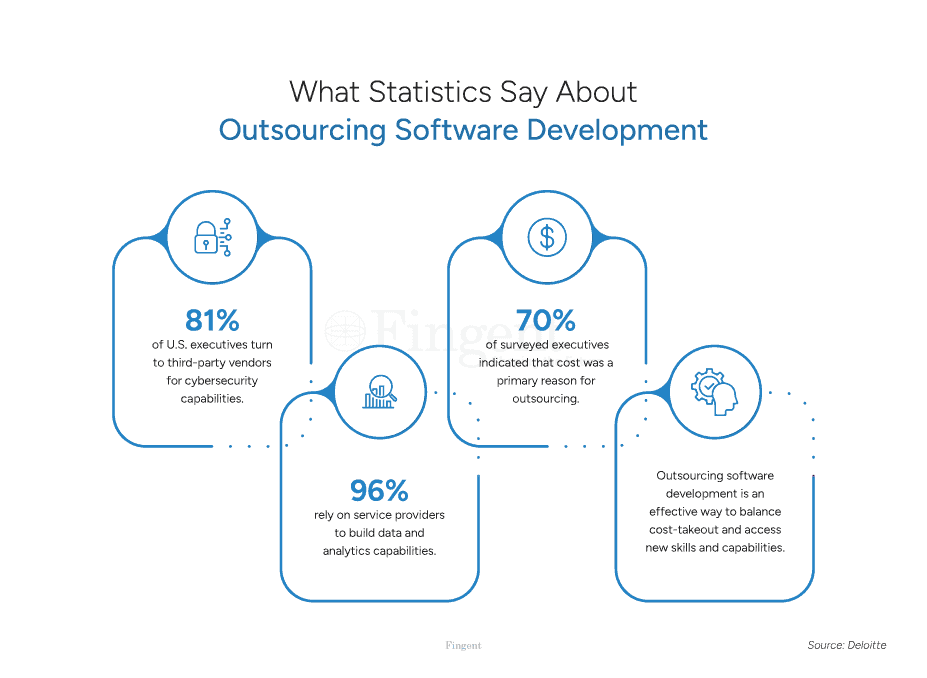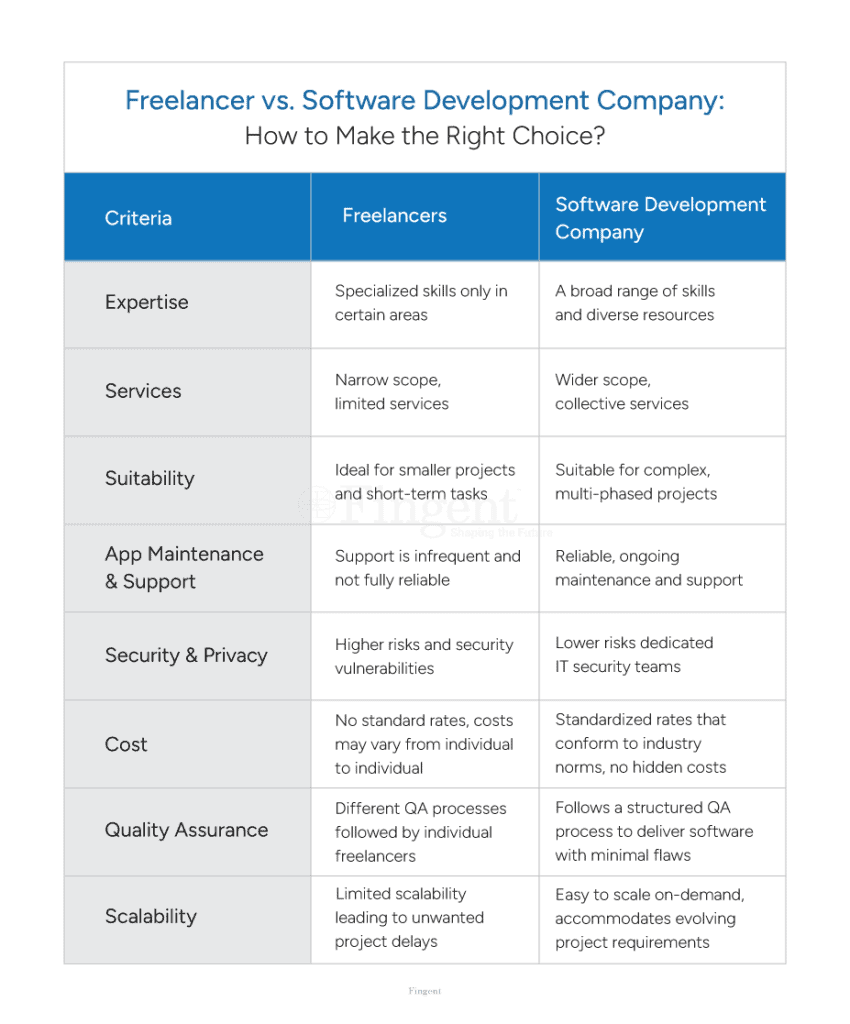Businesses need modern technology to survive today’s ever-evolving market. The right enterprise software solution can help businesses thrive. However, not all businesses might have the necessary in-house skills to develop one, and let’s be honest, off-the-shelf software does not fit all needs. Thanks to custom software development vendors, enterprises can access technology experts on the go to build customized technology solutions that cater to their unique business needs.
According to a survey by Deloitte, 79% of U.S. executives currently outsource software development. However, any business application is only as good as the developer who creates it. Choosing the right software development partner is a crucial responsibility.
If your business plans to hire an app development partner, here’s a quick checklist that can help. But before we get started, let’s look at why you need to choose the best software development vendor.
Have an Innovative Idea for Your Next Application?
Why Do Businesses Need Software Development Vendors?
Organizations rely on app development partners to:
- Bridge talent gaps and save in-house hiring costs
- Drive value by developing end-to-end solutions
- Access the best of technology, skills, and expertise
- Avoid development delays and cut operating costs
- Increase speed-to-market and enhance core competencies
- Mitigate the risks of running an in-house development project
You can easily unlock these advantages by choosing the right software development vendor. But what happens if you choose the wrong app development partner? Here are the risks!
Risks of Choosing a Wrong Software Development Vendor
Wrong software vendor selection can leave a lasting impact on your company.
- Poor-quality software rollouts can lead to massive sales losses. It can force your customers to go to competitors.
- Ill-fitted software solutions affect your day-to-day operations and increase your team’s workload.
- A bad match will never help you with add-ons and customizations you might need for the future.
- Botched software can cause frequent business disruptions. It can affect your customer experience, reputation, and brand.
- Faulty software can lower your team’s morale and engagement. Constant software glitches add to employee frustration and fatigue.
- A wrong vendor may not be able to meet your deadlines. They may also charge you more than expected. There is always an inherent risk of hidden costs.
- Communication breakdowns can create misunderstandings between the vendor and your stakeholders.
- Inadequate security measures opted by the vendor can put your business at risk. It can increase the chance of damaged, lost, or stolen data.
How can you avoid these risks? Ace software development vendor selection by using our checklist (below).
Why is Legacy Software Modernization Inevitable for Businesses?
Checklist: How to Choose the Right Software Development Vendor?
1. Define Your Needs and Goals
The first step to finding the right developer is identifying your goals. Why do companies seek to build customized software? Some of the common reasons are:
- Enhancing customer experience and satisfaction
- Improving workforce productivity and operational competency
- Tracking and managing staff responsibilities
- Automating specific tasks and repetitive functions
- Boosting reliability and security
A good discernment of your objectives and business needs will allow you to proceed to the next steps more efficiently.
2. Set up a Budget
Defining your goals should help you prepare a detailed budget. At this stage, it is important to determine the capital, expenditures, and forecasted return on investment (ROI).
Assess the factors that impact the cost of your software development project:
- Type of software you need and its level of complexity
- Custom software or off-the-shelf software
- UX/UI design considerations
- Backend infrastructure and dependencies
- Integrations with other applications you use
- Location of the app development partner
- Development time, resources employed
- Investments in new technologies
- Estimates/rates quoted by the software development vendor
Any business’s priority is to produce high-quality software. However, keeping the project within budget is vital for business success.
3. Research Potential Vendors
Research potential software development vendors. Assess the selected app development partners based on the following factors:
- Do they have experience working on the type of software you need?
- Have they worked in your industry or domain in the past?
- Do they handle the entire software development lifecycle? Do they provide post-launch application maintenance and support?
- Do they help train your staff on the new software?
- What are the services they offer?
- Does their rate fit your budget?
- What other value-added services do they provide software development? Developing an e-commerce application, maybe?
4. Shortlist Top Software Development Vendors
Choosing from hundreds of service providers can be overwhelming. Once you do the research and specify your requirements, you can start shortlisting the options you find appealing.
Here are a few ways to narrow down your list:
- Read through the company profiles, case studies, and client testimonials of potential vendors.
- Use any credible B2B rating platform to check out their ratings and reviews. Platforms like Clutch, GoodFirms, etc. list the top vetted software development partners.
- Filter vendors based on their minimum project costs, team size, average ratings, and location.
- Keep your list short so you can reach out to the selected firms quickly.
5. Talk to Each of the Selected Vendors
A direct conversation with the software development vendor gives you a fair idea of their services and expertise.
Before meeting a vendor, prepare a set of questions that will help you gauge their work:
- What technologies and programming languages are your team proficient in?
- What are the industries and domains that you primarily cater to?
- What project management tools do you use to manage your workflows?
- How do you ensure the quality of your software?
- What is your project engagement model?
- What software development methodology do you follow—Agile, Waterfall, RAD, Lean?
- How do you determine the costs of your work?
- Is my budget and expected timeline realistic for my project?
Above all, it’s crucial to identify if the potential vendor’s way of operating and objectives align with your requirements.
6. Narrow Down Your List Further
A direct conversation with each vendor should help you narrow your choices between two or three developers.
- Consult your leadership team. Weigh the pros and cons of each vendor based on your analysis.
- Shortlist your selection to one or two providers. Ensure they can understand your needs and match your company’s culture.
7. Data Security and Privacy Measures
Your business software needs to handle confidential company data. Is your software development partner capable of protecting your application from cyber threats?
- Before choosing a software development vendor, undertake an intellectual property due diligence inquiry.
- Find out how the vendor will be handling your data and assets.
- Review their integrated security and IP protection program.
- Determine the internal measures you should adopt to safeguard your enterprise’s IP.
- Identify which functions need to be managed in-house and what should be outsourced.
8. Compliance, Reliability, and Support
Along with analyzing the vendor’s cybersecurity offerings, you also need to verify:
- Does the vendor’s development and delivery practice/policies comply with the essential regulations?
- Have you done extensive background checks to ensure the integrity and reliability of the vendor?
- Did you do a proper technical and strategic vetting of the selected development vendor?
- Is the vendor equipped to address unexpected IT outages and disruptions?
- What are the risk management policies/processes followed by the software development vendor? Do they have a robust disaster recovery plan?
- Does their development process align with your organization’s sustainability goals?
- Does the vendor stick to responsible application design, development, and maintenance that can reduce the environmental impact?
Choosing the right software development partner requires careful planning. It’s indeed a very tricky job to pick out the right one from a huge list of potential vendors. The checklist aims to make the job simple for you.
Nearshore vs In-House Software Development: Know The Pros & Cons
Software Development Company vs. Freelancer: Which is Better?
What is the difference between a freelancer and a software development company?
- A freelancer is an individual who works independently on software development projects.
- A software development company is a professional organization that provides software development services.
How does working with a software development company help your business?
- A team of certified professionals well-versed in multiple areas
- Access to the latest technologies and specific domain expertise
- A reliable vendor-customer contract (agreement) to back you
- Round-the-clock support and IT help desk
- Transparent communications, no hidden surprises
- Standardized pricing with no additional costs
- Dedicated ongoing maintenance and support
Transform Your Business With the Right Software Development Vendor
The best software development vendor:
- Works with you throughout the entire development process
- Helps navigate the complexities of software creation and maintenance
- Makes incremental changes for continuous software enhancement
- Develops tailor-made solutions that align with your business goals
- Improves your business’s efficiency, productivity, and financial performance
Let Us Help You Ease Your Digital Transformation Journey
Why Choose Fingent as Your Software Development Partner?
Since 2003, Fingent has been a reliable and capable software development partner for leading global brands, including several Fortune 500 companies.
- An impeccable track record as a successful custom software vendor
- Experience in new and emerging technologies—AI, AR, VR, IoT, blockchain, and more
- Legacy application modernization, cloud migration
- Multi-platform development—web, mobile, cloud, and more
- Diverse offshore talent pool with experienced developers and tech professionals
- Tech certifications, partnerships, centers of excellence
Build scalable and robust applications by partnering with a professional custom software vendor. Contact us to get an extended consultation.
[ad_2]
Source link





